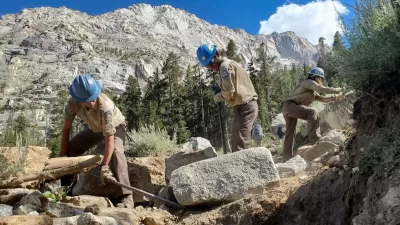Many of those who have recently graduated in planning are currently asking “how can I get a job?” Of course a number of recent graduates do have work. But government budget cuts may mean that local jobs are hard to get. This is the time to use your imagination. To get you started here are some ideas:
Many of those who have recently graduated in planning are currently asking "how can I get a job?" Of course a number of recent graduates do have work. But government budget cuts may mean that local jobs are hard to get. This is the time to use your imagination. To get you started here are some ideas:
- Nonprofits are a great place to start. They seldom pay well but you will get experience and typically you will be helping save some aspect of the planet as well. Unpaid internships can often lead to nonprofit jobs-as long as you impress them!
- Small cities, particularly ones in out-of-the-way places, can also be a great place to work as you'll get to do a bit of everything. You may even start off as planning director-though if that is the case be sure you find a support network!
- Big cities often have big and complicated bureaucracies with planning jobs in less obvious places like housing agencies, public works departments, and facilities management groups. Look beyond the planning and zoning departments.
- Similarly, big engineering, architecture, and development firms may have small units that do planning work-planning sites and districts, getting permissions or entitlements, doing public participation, or coordinating projects. One of my most interesting professional experiences was bidding for a job as a subcontractor to the planning unit in a multinational engineering firm. It was fascinating seeing how they put together the proposal.
- Very small planning firms often hire part-time and hourly people when they have work. Big firms doing smaller projects in your local area may need helpers for things like public meetings. It is a bit unpredictable as a long-term employment strategy but it can give you useful skills and potentially good references. Let your contacts, including your network of fellow graduates, know you are available.
- Freelancing can take the form of subcontracting for small and big firms, or you can directly contract with a city or other planning entity. Again, it isn't the most stable work but it can give you the experience to get a more permanent job. Over the years I've done quite a bit of this kind of work, a lot of it remotely.
- Related fields: There are often positions to be had in public policy, foundations, the softer side of engineering, mapping, and so on. There may well be alumni of different colleges who could provide contacts. Take advantage!
Finally, as well as types of employers you should also consider the locations where you are looking for work. In an earlier blog I advised to be prepared to go to Kansas, meaning a place where you can get great experience and don't have to compete with dozens of other recent graduates. There is life beyond Boston, New York, and San Francisco.
And in the interim stay gainfully unemployed. Work will come eventually.
This is May's blog, a few days late.

Maui's Vacation Rental Debate Turns Ugly
Verbal attacks, misinformation campaigns and fistfights plague a high-stakes debate to convert thousands of vacation rentals into long-term housing.

Planetizen Federal Action Tracker
A weekly monitor of how Trump’s orders and actions are impacting planners and planning in America.

In Urban Planning, AI Prompting Could be the New Design Thinking
Creativity has long been key to great urban design. What if we see AI as our new creative partner?

King County Supportive Housing Program Offers Hope for Unhoused Residents
The county is taking a ‘Housing First’ approach that prioritizes getting people into housing, then offering wraparound supportive services.

Researchers Use AI to Get Clearer Picture of US Housing
Analysts are using artificial intelligence to supercharge their research by allowing them to comb through data faster. Though these AI tools can be error prone, they save time and housing researchers are optimistic about the future.

Making Shared Micromobility More Inclusive
Cities and shared mobility system operators can do more to include people with disabilities in planning and operations, per a new report.
Urban Design for Planners 1: Software Tools
This six-course series explores essential urban design concepts using open source software and equips planners with the tools they need to participate fully in the urban design process.
Planning for Universal Design
Learn the tools for implementing Universal Design in planning regulations.
planning NEXT
Appalachian Highlands Housing Partners
Mpact (founded as Rail~Volution)
City of Camden Redevelopment Agency
City of Astoria
City of Portland
City of Laramie






























